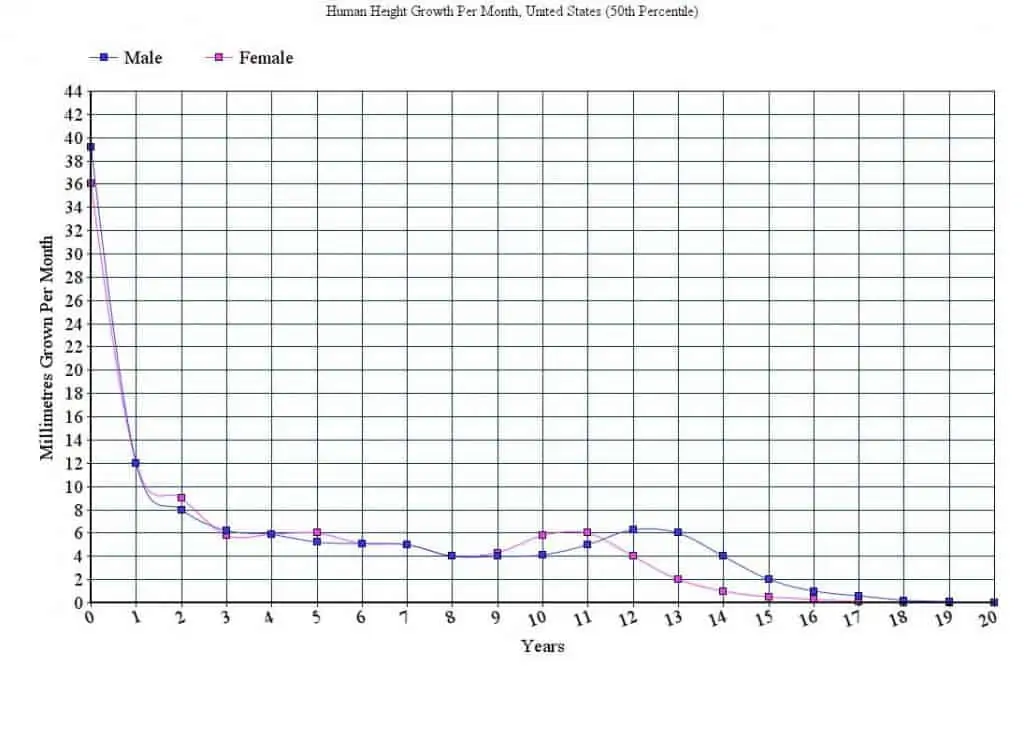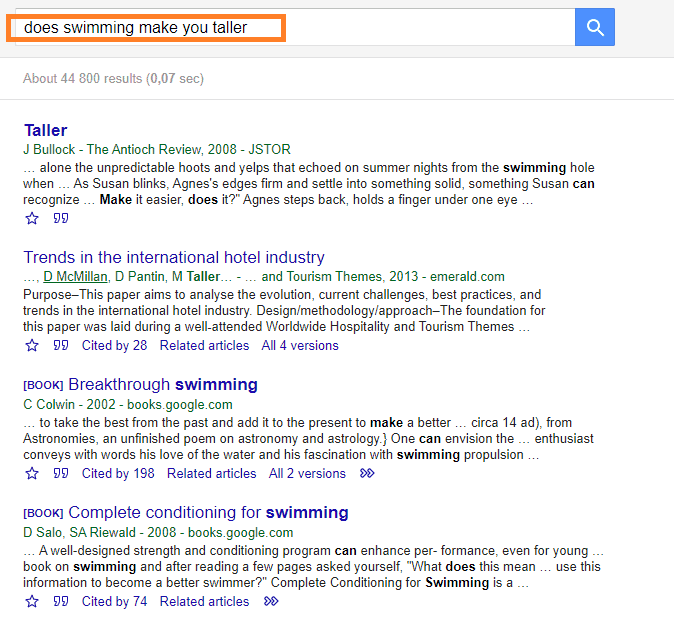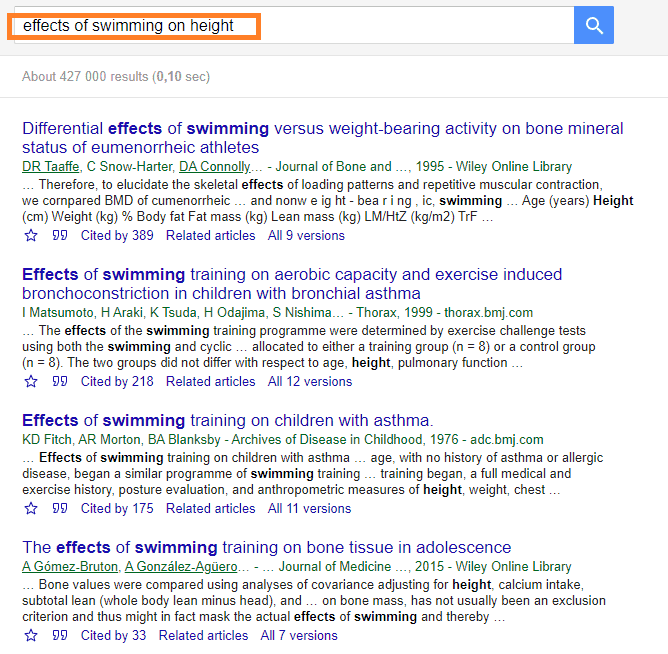Swimmers are widely known as some of the tallest athletes on the planet and it is no secret either that swimming is one of the best forms of exercise. Swimming helps to build up cardiovascular fitness, muscle tone and can burn off a ton of calories. But the question remains- does swimming make you taller?
In today’s article, we’ll be taking a look at whether or not swimming can make you taller. We’ll dive into some research regarding the topic of growth and we’ll also take a look at a few ways that you can ensure that you reach your height potential during your growth stages.
Does Swimming Make You Taller?
In Short- No, swimming doesn’t make you taller. While swimming the force of gravity is removed from the spine, allowing the spine to decompress, making the swimmer appear taller. So while swimming may temporarily elongate the body, there is no evidence suggesting that swimming will permanently increase height.
As you can see, any height (if any at all) gained during swimming is only temporary and won’t make a noticeable change in your height or appearance.
It is also important to note that height variation throughout the day is completely normal according to the Journal of Annal of Human Biology and may differ by up to half an inch (1.5cm) depending on the time of day, meaning that you may falsely believe that swimming helped to increase your height, depending on the time of day you measure yourself.
That said, although swimming can’t directly increase your height (especially so once your growth plates have closed and you stop growing usually at the age of 18), it can contribute to a healthy lifestyle which may aid in ensuring that you reach your genetic growth potential. We’ll discuss all of this in a lot of detail in just a second so stick around.
Why Do People Believe That Swimming Can Make You Taller?
Many people believe that swimming helps to increase height as many of the most well-known swimmers around the globe are very tall. Just take Michael Phelps for example- Coming in at a height of 6 feet and 3 inches (193cm) Michael is probably the most well-known swimmer around the world, winning a grand total of 83 international medals, 28 of which are Olympic medals.
Here are some other well-known swimmers who are also seriously tall-
- Matt Grevers (6’9”)
- Matt Biondi (6’7”)
- Nathan Adrian (6’6”)
- Tom Jager (6’4”)
- Sarah Sjostrom (6’1”)
- Cate Campbell (6’1”)
The common belief here is that these swimmers are tall, because they have been swimming for many, many years since very young ages.
Everything about this statement is, however, completely wrong. These swimmers are well known on the world stage because their height has given them the advantage to reach that level of competition. Obviously, hard work and dedication also play a big role, but their physical advantage also definitely contributes to their success in the pool.
Another possible reason for the belief that swimming can help you to grow taller is the appearance that many age-group swimmers seem to shoot out above their peers while this is in fact not the case. You see, young swimmers that exhibit a lot of talent are often on the taller side, these swimmers are also more likely to be covered by the media, drawing attention to them, and thus making it seem like swimming is the reason for their tall height.
Some age-group swimmers might also start swimming during their growth peak, meaning that they’ll gain a lot of height in this period, leading to the false belief that swimming is the reason for that growth while in fact, it was just a natural process caused by their hormones.
Below are some screenshots of research study archives. As you can see there are no relevant studies suggesting that swimming can make you taller-
What Determines How Tall You Will Grow?

So now that we’ve cleared the myth that swimming can make you taller out of the way, you may be wondering- so what exactly is going to determine how tall I will grow?
The main factor that will determine how tall you can grow is your genetic makeup. If you come from a family where your grandparents, uncles, aunts, nieces, nephews, and most importantly your parents are naturally tall the chances are much higher that you’ll also be tall since it is in your genetic makeup.
On the other hand, if you are from a family where your family members are generally shorter the chances are high that you’ll also be on the shorter side.
That said, it is important to note that this might not always be the case and that there are exceptions where people coming from tall families turn out short while others from shorts families end up growing very tall.
Generally, scientists believe that your genetic makeup (DNA) is responsible for about 80% of a person’s height. The other 20% can be determined by external factors that may influence your height such as nutrition, hormones, activity levels, and certain medical conditions.
Most People Won’t Grow Taller After the Age of 18
Now that we know what determines how tall you can grow, let’s have a look at the ages where you can expect this growth to occur.
Below is a graph indicating the growth per month by age-

As you can see the majority of growth occurs between the ages of 1 and 2 years old and then tailors off for the next 8-10 years staying quite even where after you’ll then see a bump in growth again as the person goes through puberty entering adulthood.
For the majority of people, growth will then completely stop at about the age of 18, but in very rare cases some individuals may see an increase in height up until the age of about 22, although this probably won’t be a significant amount.
Related: 9 Tips For Short Swimmers To Compete At The Highest Level.
Do You Want to Make Every Lap Count?
Stop wasting your time in the pool feeling lost and doing directionless swim workouts, and start training effectively! Our ebook contains 97 structured and goal-orientated swim workouts to help you become a better, faster, and fitter swimmer. Whether you’re a complete beginner or a seasoned pro, there are a multitude of workouts for every type of swimmer.
How to Maximize Your Height Growth- a Healthy Lifestyle Is the Answer
Now that we know what causes an increase in height and during what ages you can expect this growth to occur, let’s take a look at a few ways you can ensure that you reach your maximum genetic height potential.
As mentioned earlier in this article, scientists have determined that about 80% of height growth is genetic. So that leaves us with about 20% determined by external factors. Below I’ve listed some of the most important external factors that can have a effect on how tall you get, let’s take a look at how you can optimize these to ensure that you reach your maximum genetic height potential-
1. Get Enough Sleep

Sleep is one of the most important factors ensuring that you grow taller during your growth years. During deep sleep, the body is triggered to release hormones that promote normal growth in children and teens. These hormones also boost muscle mass and help to repair cells and tissues in your body.
Generally, it is accepted that 8 hours of sleep is a good amount of sleep to get every night. And although this is generally true, more sleep may be required at certain ages.
Here are the official recommendations from the national Sleep Foundation–
- Newborns (0-3 months)- 14 to 17 Hours Sleep/ Day.
- Infants (4-11 months)- 12 to 15 Hours Sleep/ Day.
- Toddlers (1-2 years)- 11 to 14 Hours/ Day.
- Preschoolers (3-5 years)- 10 to 13 Hours/ Day.
- School Children (6-13 years)- 9 to 11 Hours/ Day.
- Teenagers (14-17 years)- 8 to 10 Hours/ Day.
- Adults (18+ years)- 7 to 9 Hours/ Day.
2. Follow a Healthy Nutrition Plan

Proper nutrition is also one of the most fundamental external factors in ensuring that you reach your genetic heigh potential. If you aren’t fueling your body with the right nutrients and enough energy it won’t be able to grow properly- even if it wanted to.
Firstly, you want to make sure that you are eating enough (aka consuming enough calories). Generally, most people meet their daily calorie needs and aren’t in a caloric deficit. The problem, however, is that most people’s diets are filled with low-quality processed food. I’m not saying that you should be eating chicken, rice, and broccoli for every meal but at least try to eat somewhat healthy.
Secondly, you want to make sure that you aren’t lacking any vitamins or minerals. These are important elements that are consumed in the form of inorganic ions by living beings, such as ourselves.
Nutrients like vitamin D and calcium are important for bone growth and overall health, which will ensure that your growth isn’t limited.
To ensure that you are receiving adequate amounts of these nutrients it is recommended to eat enough fresh fruit and vegetables, while calcium is commonly found in dairy products such as milk.
Furthermore, protein is also an essential component of bone health and growth. It is recommended to try and consume at least 20 grams of protein every time you eat, some good sources of protein include eggs, poultry, lean meats, and dairy while plant-based products such as soy and legumes are also high in protein.
Related: How to create a meal plan for swimmers.
3. Exercise Enough

This last point might seem a bit hypocritical as I just said that swimming can’t increase your height- and although this fact remains true for swimming and pretty much all other sport types and stretching activities it doesn’t mean that exercise can’t indirectly increase height.
When referring to whether or not swimming can increase height we are talking about the sport itself and how its mechanics affect the body, meaning the swimming can’t directly increase height, but indirectly exercise can in fact help to promote growth.
Exercise in itself is never a bad thing anyway and it does in fact contribute to a healthy lifestyle which is needed to maximize your genetic growth potential. Not to mention that vitamin D can also be obtained from the sun if you exercise outdoors.
Statural growth (a complex process that is determined by the interaction of genetics, nutrition, and socioeconomic factors) “depends on a neuroendocrine programme which channels nutrient energy towards increments in lean body mass.”
Studies have shown that “exercise can facilitate this growth and is a required stimulus for reparative growth through its stimulatory effects on secretion of growth hormone and other anabolic hormones.”
This means that although swimming can’t directly contribute to increasing your height, it can, in fact, contribute to a healthier lifestyle which may aid in ensuring that you reach your maximal genetic height potential. So if you are still up for it, I highly recommend making swimming a part of your exercise routine.
Swimming Won’t Make You Taller
At the end of the day, it is important not to be discouraged by being a shorted individual. Rather you should accept that this is something that is (mostly) out of your control and you should focus on the things that you can control such as, in the case of a competitive swimmer, perfecting your stroke technique and working as hard as you can in training.
For those of you who are still under the age of 18, don’t worry too much. Just enjoy your days as a child and teenager. Have fun, play sports, make friends, and spend time with your family. If you are worried about being short, then make sure to follow a healthy lifestyle, and who knows maybe you become the world’s next tallest person!







